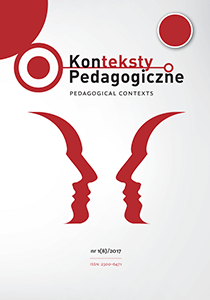Abstract
The Theatre in Education programmes directly develop individual re-sources of young people by shaping, particularly, their ability to take responsible decisions, their belief in self-efficacy, their self-control mechanisms and their communication. These programmes make it possible to safely raise difficult sub-jects in a way that young people can find attractive. Using a show element, we can present a specific but also universal and credible story, embed the characters in the reality of life, show their problems, and then look for solutions along with the participants. This formula by handing the self-agency over to them, helps young people make decisions. Whereas, taking responsibility for their decisions, makes it possible for the participants to experience the programmes more deeply and consequently, to understand them better. The article describes the “Drama Therapy as a Method for a Safe Middle School Student” project which is co-financed by the Ministry of National Education, as well as the results of the survey carried out during the project.
References
Arkin, R.M., Grove, T. (1990). Shyness, sociability and patterns of everyday affiliation. Journal of Social and Personal Relationship, nr 7, doi: 10.1177/0265407590072008.
Buss, A.H., Plomin, R. (1984). Temperament: early developing personality traits. New York: Lawrence Erlbaum Associates.
Cheek, J.M., Buss, A.H. (1981). Shyness and sociability. Journal of Personality and Social Psychology, nr 41(2), doi: 10.1037/0022-3514.41.2.330.
Coulter, J. (1986). Affect and social conext: Emotion definition as a social task. W: R. Harre(red.), The social construction of emotions. Oxford: Blackell.
Eisenberg, N., Fabes, R.A., Murphy, B.C. (1995). Relations of Shyness and Low So-ciability to Regulation and Emotionality. Journal of Personality and Social Psychology, 68(3).
Goffman, E. (1981). Człowiek w teatrze życia codziennego. Warszawa: PIW.
Goleman, D. (1997). Inteligencja emocjonalna. Poznań: Media Rodzina.
Lewandowska-Kidoń, T. (2003). Drama w kształceniu pedagogicznym. Lublin: Wydaw-nictwo UMCS.
Oniszczenko, W. (1995). Diagnoza temperamentu w ujęciu genetycznej teorii Bussa i Plomina: Kwestionariusz Temperamentu EAS-TS. Studia Psychologiczne, 33.
Ostaszewski, K. (2006). Pozytywna profilaktyka. Świat Problemów, 3(158).
Pankowska, K. (2000). Pedagogika dramy, teoria i praktyka. Warszawa: Żak.
Rosenberg, M. (1990). Reflexivity and emotions. Social Psychology Quarterly, 53.
Shott, S. (1979). Emotion and social life: A symbolic interactionist analysis. American Journal of Sociology, 84.
Strelau, J. (1998). Psychologia temperamentu. Warszawa: PWN.
Wey, B. (1987). Development through drama. London: Longman.
In accordance with the recommendation of the Ministry of Science and Higher Education, which aims to counteract the practice of “ghostwriting” and “guest authorship,” all authors submitting their text for publication should attach an author’s statement which declares the contribution of each of the authors to the article. The printed and signed statement should be delivered by mail or other means to editor-in-chief Joanna Skibska or sent in the form of a scan to the following e-mail address: redakcja@kontekstypedagogczne.pl. The authors will not receive remuneration for publishing their papers. The editors reserve the right to make minor editorial changes to the articles which will not affect the substance of the article. We encourage all authors to prepare their articles in accordance with the guidelines for manuscript preparation. Download pdf file.
Authors transfer all copyrights and grant the journal the right of first publication with the work simultaneously licensed under a Creative Commons Attribution License that allows others to share the work with acknowledgement of the work's authorship and initial publication in this journal. All authors agree to the publishing of their email addresses, affiliations and short bio statements with their articles during the submission process.

